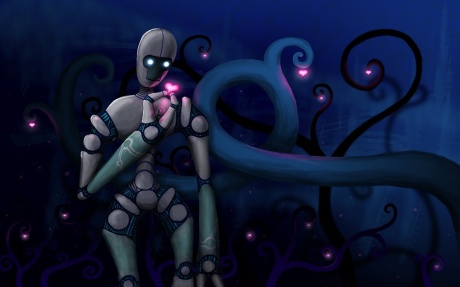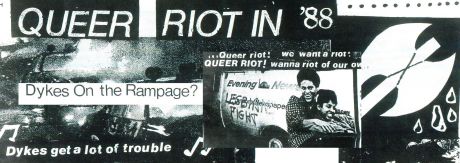Lonely Robots: Transhumanist Responses to Unfuckability July 4, 2017
Posted by Summerspeaker in Feminism, Queer politics, Science Fiction, Technology, Transhumanism.Tags: desire, future, queer, romance, sex
add a comment
Soon after I mentioned being genderqueer during a conversation at the Extreme Futurist Festival 2011, the person I was talking to responded, “Wow, it must be hard for you to find sexual partners!”
“Gee, thanks,” I thought. As tactless as that remark may have been, it wasn’t wrong. This piece by Meredith Talusan explores some of the dynamics involved. Unfortunately, complaining about not getting laid immediately calls to mind masculine sexual entitlement to women’s bodies. I’m not sure it can escape that established trope.
The question of who’s considered attractive and who receives affection matters, but it’s unclear what to do. Most successful folks on the left and elsewhere enjoy their social power and/or romantic/sexual attractiveness. Critiques of the status quo as making it difficult for some to realize their desires potentially unsettle the existing elite, so they’ve no interest in pushing such critiques.
It’s telling Talusan’s article centers the achievement of Jacob Tobia and Alok Vaid-Menon, taking for granted the notion that prominent folks should get dates. What about all the humans who conform to neither ideals of attractiveness nor of success?
Well, nobody cares about those losers!

Anybody who values the overall good should care, though, and some do, or at least pretend to. Transhumanism offers various theoretical easy fixes to the problems of loneliness and unfuckability, albeit with severe implementation issues and philosophical implications.
Wait, some people are poor, ugly, crazy, and/or sick? Let’s use technology to get them up to standard. We can all be sexy immortal billionaires!
A lot of transhumanists think this way.
As simplistic as this perspective is seems, the difficulty if not impossibility of conforming to existing norms indeed accounts for much of their oppressive power. Currently, the genetic lottery, money, and time determine who’s beautiful, hot, sexy, stunning, etc. If anybody could make their body match ideals of physical beauty, the advantage the genetic elite have in this regard would evaporate.
On the other hand, the normatively gorgeous don’t necessarily have the kind of sexual and romantic relationships they want, so opening access to beauty hardly seems sufficient. Additionally, what about folks who chose unpopular aesthetics? They might still find themselves undesirable despite full morphological freedom. Additionally, deprived of the genetic hierarchy, attractiveness norms could shift to become akin to fashion: “Girl, that body is so last month!”
The prospect of modifying minds quickly leads to questioning the basis of individual identity. For example, assuming I could make myself think and behave as popular and successful people do, would I want to? What about rewiring my mind to disregard social status and affection entirely? Would I still be me if I did either of those? I don’t know. Many of us stubbornly wish to remain who we imagine ourselves to be.
Matching Algorithms
Given the wide array of different desires folks have, morphological freedom by itself seems inadequate for solving the problem of loneliness and unfuckability. And of course full morphological freedom would require technological innovation and economic transformation; it’s a long way off.
However, there’s potential to make things dramatically better in the nearer term. Matching algorithms, such as featured on dating sites like OkCupid, can facilitate connections and enable romantic/sexual relationships. This ain’t necessarily that great at the moment, but the principle of aligning people’s desires, interests, etc. has promise. As big the world is, there’s probably at least a few folks somewhere whose desires match up with any given person’s at any given time.
For instance, let’s say I want to get tied up right now. I don’t know anyone who I think would be interested, but there’s a decent chance one or more of the planet’s seven and half billion humans is, especially if they had an idea of who I am and a basic level of trust. There might even be somebody my city or neighborhood.
Increasingly sophisticated digital networks can theoretically hook people up for both romantic/sexual relationships and other interactions, decreasing loneliness and improving quality of life. We already try to do this with our social media, though it’s a rather blunt instrument at present.
Certain transhumanists and others look optimistically to sexbots, predicting physical and mental health benefits. Yet, in addition to raising questions about objectification, sexbots are unlikely be able to convey the social status associated with romantic/sexual desirability. While some may eventually function as romantic partners, this wouldn’t be equivalent to human partnership unless they had human-level or above artificial intelligence and autonomy like a human. Sexbots might well alleviate the pain of unfuckability by human standards, but it’s unlikely they would completely resolve the problem. As Sherry Turkle and company argue, the prospect of sex and love with robots has the potential pitfalls. I find those concerns mostly misguided but relevant here.
Virtual Reality
Virtual reality offers a number of benefits for sexual/romantic relations, whether between humans or between humans and AIs. VR makes change ones appearance trivial, eliminating that aspect of the genetic lottery. By transcending geographic limitations, VR in conjunction with matching algorithms could dramatically increase the odds of meaningful connections.
VR sexbots have the same issues as physical ones, albeit with perhaps less stigma. With or without sexual/romantic elements, VR worlds could simulate social status, as games do today. Losing oneself in VR entails similar philosophical challenges to transforming one’s psyche as described above.
Conclusion
None of the above technologies can replace the political and social project of creating a more accessible and fulfilling society, but they can assist in that project and make life more livable in any case.
Pride’s Queer Future June 27, 2017
Posted by Summerspeaker in Anarchism, Anti-imperialism, Feminism, Queer politics, Science Fiction, Transhumanism.Tags: future, Pride, queer, SJW, Zionism
add a comment
The year is 2020.
Pride events across the United States have banned cops, corporations, Zionism, & U.S. nationalism.
Talking heads rail about intersectionality as masked queers loot banks and big-box stores.
Cishet white men approach with caution, assuming the SJW mob will rip them apart. Instead they find themselves caught up in the revolutionary fervor.
Semi-autonomous remote-controlled drones assault police cars and stations massive numbers.
Law and order breaks down. It’s chaos in the streets.
New worlds are forming.
